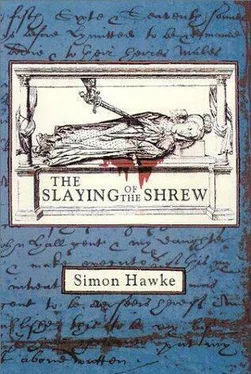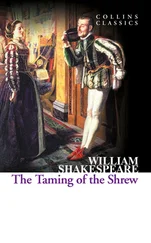Simon Hawke - The Slaying Of The Shrew
Здесь есть возможность читать онлайн «Simon Hawke - The Slaying Of The Shrew» весь текст электронной книги совершенно бесплатно (целиком полную версию без сокращений). В некоторых случаях можно слушать аудио, скачать через торрент в формате fb2 и присутствует краткое содержание. Жанр: Исторический детектив, на английском языке. Описание произведения, (предисловие) а так же отзывы посетителей доступны на портале библиотеки ЛибКат.
- Название:The Slaying Of The Shrew
- Автор:
- Жанр:
- Год:неизвестен
- ISBN:нет данных
- Рейтинг книги:5 / 5. Голосов: 1
-
Избранное:Добавить в избранное
- Отзывы:
-
Ваша оценка:
- 100
- 1
- 2
- 3
- 4
- 5
The Slaying Of The Shrew: краткое содержание, описание и аннотация
Предлагаем к чтению аннотацию, описание, краткое содержание или предисловие (зависит от того, что написал сам автор книги «The Slaying Of The Shrew»). Если вы не нашли необходимую информацию о книге — напишите в комментариях, мы постараемся отыскать её.
The Slaying Of The Shrew — читать онлайн бесплатно полную книгу (весь текст) целиком
Ниже представлен текст книги, разбитый по страницам. Система сохранения места последней прочитанной страницы, позволяет с удобством читать онлайн бесплатно книгу «The Slaying Of The Shrew», без необходимости каждый раз заново искать на чём Вы остановились. Поставьте закладку, и сможете в любой момент перейти на страницу, на которой закончили чтение.
Интервал:
Закладка:
“Do you think he saw us?” Shakespeare whispered, as they watched from their hiding place in the shrubs.
Smythe shook his head. “I do not believe so,” he replied, very softly.
“Who is it?” whispered Elizabeth.
“I cannot tell,” said Smythe. “Be very still. We shall find out in a moment. He is coming this way…”
10
As the dark figure came closer, they all crouched behind the shrubbery and kept very still. Clearly, whoever it was had not seen them, for he kept coming directly towards them on the path, moving briskly. As he came closer, they still could not see who it was, for the figure was wearing a dark cloak and a hat and his face was in shadow. As he drew even with them, and they still could not discern his features, Smythe surprised both Shakespeare and Elizabeth by suddenly lunging out from their hiding place and throwing himself upon the dark figure, seizing him around the waist and bringing him down upon the ground.
The man grunted as Smythe brought him down, but otherwise did not cry out. However, he fought back fiercely, struggling in Smythe’s powerful grasp as they rolled around on the ground.
“Hold him, Tuck!” said Shakespeare, rushing to his aid.
At the same time, Smythe’s antagonist brought up his knee sharply and Smythe wheezed with pain as the blow struck his groin. He let go and the stranger rolled away, but Shakespeare leaped upon him before he could rise back to his feet.
“Aha! I have you now!”
“Shakespeare, let go of me, you damned fool!” “What… Good Lord! Sir William?”
Worley pushed him off and got to his feet. He was dressed all in dark clothing, a stark contrast to the resplendent suit he had worn earlier. He bent over Smythe, solicitously. “Tuck… are you injured?”
Smythe made a gasping, wheezing sort of sound and nodded weakly.
“Hell and damnation. Come on, then, shake it off. Give me your hand… Help me, Will, he weighs more than a bloody ox.”
Together, they helped Smythe to his feet.
“Forgive me, Tuck,” Sir William said. “Are you badly hurt?”
“I… I shall live… I think,” Smythe managed, his voice strained and constricted.
“Sir William, we had not realized ‘twas you,” said Shakespeare. “We thought you might have been the killer! Whatever were you doing out here at this time of night?”
“I might well ask you lot the same thing,” Worley replied.
“We were attempting to deduce who murdered Catherine tonight,” said Shakespeare.
“You mean this morning,” Worley said.
“No, I mean tonight,” said Shakespeare. “She was stabbed to death sometime this evening in her tomb.”
“A moment,” Worley said, frowning. “I could have sworn that you just said she was stabbed to death this evening in her tomb.”
“Aye, she was slain within her tomb, milord,” said Smythe.
“Presumably, one must already be dead before one is laid to rest within a tomb,” said Worley. “I mean, ‘tis customary, is it not?”
“Under ordinary circumstances, ‘twould indeed be so,” Smythe replied, “but in this case, things were far from ordinary. Catherine was not dead when she was laid to rest within her tomb, you see, but merely drugged with a potion so as to feign death.”
“You see, milord, ‘twas all a plot conceived by Catherine and Elizabeth,” Shakespeare added, “to enable Catherine to escape the marriage to Sir Percival and instead run off with John Mason.”
“John Mason? It so happens I have a young groom by that name.”
“And it so happens Catherine had a young lover by that name,” said Shakespeare.
“ ‘Twas the very same man, milord,” said Smythe.
“My groom was Catherine’s lover?” Worley glanced from Smythe to Shakespeare to Elizabeth. “Can this be true?”
“Aye, Sir William,” she replied. “ ‘Tis true.”
“Zounds! Where is he now?”
“Middleton has him locked away somewhere, presumably,” said Shakespeare. He quickly brought Sir William up to date on what had happened.
“Astonishing!” said Worley, when the poet had finished. He shook his head. “What a terrible and tragic twist of fate. The poor, unfortunate girl.”
Smythe had, by now, largely recovered from the effects of the blow, though he still stood a bit bent over. “We were going to question the carpenter, Sir William. We think the killer might have been young Holland. No one has seen him since the funeral, it seems.”
Worley shook his head. “Not so. Holland was surely not the killer,” he said. “I, for one, have seen him.”
“When, milord? And where?” asked Smythe.
“Just now, back there,” said Worley, jerking a thumb back toward the maze.
“In the maze?” Elizabeth said, with surprise. “Why, whatever would he be doing in there?”
“Blanche Middleton,” said Worley, dryly, “with apologies for my indelicacy, milady. But within moments after I returned, I saw young Holland skulking about suspiciously and so decided to follow him. The two of them met within the maze, in an arbor at its center, and were still… actively engaged… when I departed. Needless to say, they did not see me. They were quite preoccupied.”
“Well, thus is my report of Blanche’s character borne out, as you can see,” Elizabeth said, with distaste. “And by no less impeccable a witness than Sir William. That she could so disgracefully disport herself on the very day of her own sister’s funeral… Heavens, need any more be said?”
“I take it, then, that her behavior in this instance does not come as a complete surprise to you?” said Worley.
“I fear not, milord,” Elizabeth replied. “Whoever barters for that baggage will be getting goods well used.”
“I see,” said Worley. “I would assume, then, that her father would be unaware of her proclivities in this regard.”
“We are informed that she plays upon him like the virginals… while being not quite virginal herself,” said Shakespeare.
“How very unfortunate,” said Worley.
“Forgive me, milord.”
“I meant the circumstances, Shakespeare, not the pun,” said Worley. “However, your apology remains no less deserved, thus I accept it. But this failing in the young lady’s character is a fortunate thing for Holland in more ways than one, as things turn out, for it now provides him with an alibi. He could not have murdered Catherine while deflowering her sister.”
“Those petals dropped quite some time ago, I fear,” Elizabeth said, wryly.
“Well, could he not have murdered Catherine and then still had time to get back here and meet with Blanche?” asked Smythe.
“What, you mean kill one sister and within the very hour make love to the other? Egad, that would be cold-blooded, indeed,” said Worley. “Such a man would be the very devil, and I do not believe that Daniel Holland answers to that description. What is more, I have ascertained that he is no imposter, but exactly who he claims to be. His father, Sir Roger Holland, whilst not a regular at court, is nevertheless well known to the queen. Thus, while young Holland may lack in judgement and discretion, he does not lack in pedigree, at least.”
“So then Holland is not our man,” said Smythe. “That still leaves us with the other three.”
“And of those three, Hughe Camden, our young inner barrister, is also who he claims to be,” said Worley. “The Earl of Oxford recalled him from the Inns of Court, where he once saw him performing in a play by Greene and thus made his acquaintance. Edward described the young man to me in some detail and I am satisified that Hughe Camden is the man whom he had met. Likewise, his father, Sir Richard, was known to several of the heralds.”
Читать дальшеИнтервал:
Закладка:
Похожие книги на «The Slaying Of The Shrew»
Представляем Вашему вниманию похожие книги на «The Slaying Of The Shrew» списком для выбора. Мы отобрали схожую по названию и смыслу литературу в надежде предоставить читателям больше вариантов отыскать новые, интересные, ещё непрочитанные произведения.
Обсуждение, отзывы о книге «The Slaying Of The Shrew» и просто собственные мнения читателей. Оставьте ваши комментарии, напишите, что Вы думаете о произведении, его смысле или главных героях. Укажите что конкретно понравилось, а что нет, и почему Вы так считаете.












